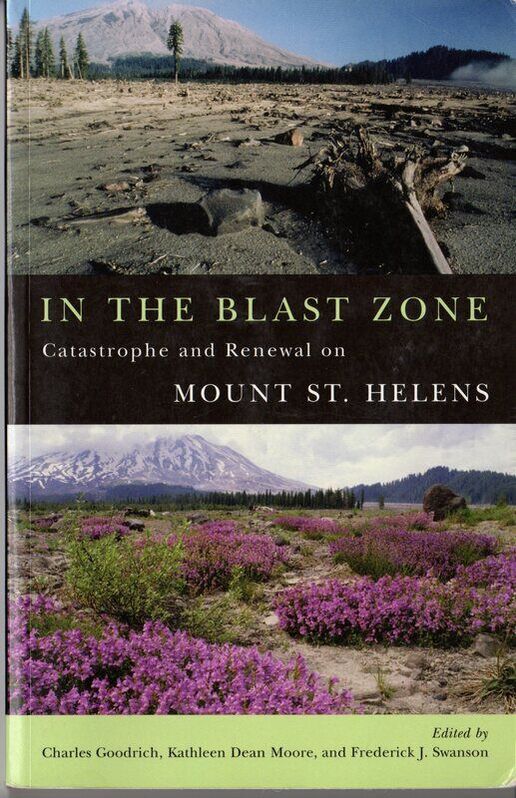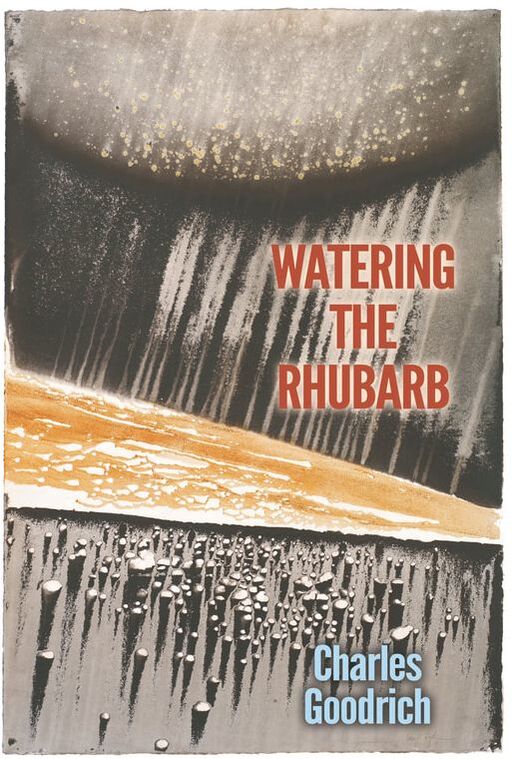
Watering the Rhubarb, poems
(Flowstone Press, 2022)
"These poems vividly display a reverence for the beauty of the natural world and a deep lament for its endangered status, but what makes them most interesting to me is the signature wry humor of their creator and his unique contrarian spirit. Where else can you read of an earthworm as a “Humble practitioner / robed only in mucus” or of addressing the current political madness by watering the garden with the contents of a tall glass of hard tapwater you’ve just drunk?"
— Clemens Starck
"In an age as coarsened as ours, we are startled by a voice so guileless, and a heart so open, as Charles Goodrich’s. Read, and be restored." — John Witte
"Charles Goodrich’s poems celebrate the body of the earth from which we come and to which all things return, as well as the power of poetry to raise its fist—full of seeds, its only weapon—against oppression. These poems share the comfort of ravens, “black wings banked around the coals of their hearts,/their bright minds/smoldering,” the particular, fleeting tang of whortleberries, and the minerally kiss of cold water drawn from a well. Contemplating the uncomfortable, such as aging, the risk of tsunami, and the self-inflicted erosion of habitat and democracy, these poems nonetheless point our eyes toward the hawks, not the “hawkers of hate.” This is poetry wholesome in the best sense, showing us how to preserve our wholeness and the flow of grateful energy amid the obstructions (major and minor) of our worldly lives."
— Karen Holmberg
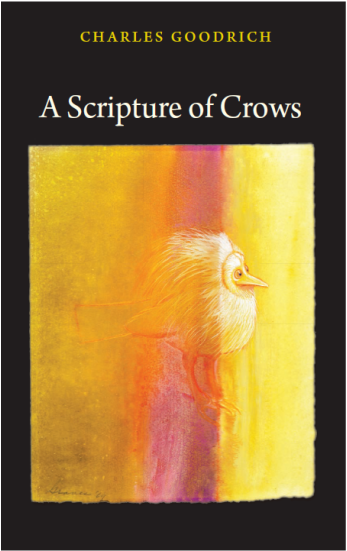
A Scripture of Crows, poems
(Silverfish Review Press, 2013)
"Charles Goodrich here writes a manifesto for world change one compact epiphany at a time. Administrator of local discoveries, he names himself a “commonist,” loyal to the local, to the democracy of creatures, to the light, keen blade of the language opening the envelope of our sleep. 'The blood you gave to mosquito,' he says, 'is what makes the bluebird / so blue.' 'Feeling as the maple tree / must feel,' he says, 'on the verge / of leafing out.' And reading, you are at eye-level with bud and dew, with seeds delving down, near joy despite the scheduled anguish of the modern world. These poems are a restorative in their deft humor and quiet promise. They will change your days, if not your life." --Kim Stafford, author of The Muses Among Us
* Kirsten Rian review of A Scripture of Crows in the Oregonian
* Read Charles' poem "Not an Omen" on Verse Daily
"Whether he is mourning the passing of a friend, channeling the ruminations of an honest old turkey vulture, or claiming kinship with the tick that hitches a ride on his socks, the poet will move and delight you. His poems draw us into a reality where mating dragonflies clack their wings 'like crazy little gods' and a nighttime camped in deep woods is filled with unidentifiable laughter. Charles Goodrich sings of transcendence and connection in a world where nature never stops sending us messages if only we can learn to read them."
--Barbara Drake, author of Driving One Hundred
A Scripture of Crows, poems
(Silverfish Review Press, 2013)
"Charles Goodrich here writes a manifesto for world change one compact epiphany at a time. Administrator of local discoveries, he names himself a “commonist,” loyal to the local, to the democracy of creatures, to the light, keen blade of the language opening the envelope of our sleep. 'The blood you gave to mosquito,' he says, 'is what makes the bluebird / so blue.' 'Feeling as the maple tree / must feel,' he says, 'on the verge / of leafing out.' And reading, you are at eye-level with bud and dew, with seeds delving down, near joy despite the scheduled anguish of the modern world. These poems are a restorative in their deft humor and quiet promise. They will change your days, if not your life." --Kim Stafford, author of The Muses Among Us
* Kirsten Rian review of A Scripture of Crows in the Oregonian
* Read Charles' poem "Not an Omen" on Verse Daily
"Whether he is mourning the passing of a friend, channeling the ruminations of an honest old turkey vulture, or claiming kinship with the tick that hitches a ride on his socks, the poet will move and delight you. His poems draw us into a reality where mating dragonflies clack their wings 'like crazy little gods' and a nighttime camped in deep woods is filled with unidentifiable laughter. Charles Goodrich sings of transcendence and connection in a world where nature never stops sending us messages if only we can learn to read them."
--Barbara Drake, author of Driving One Hundred
Going to Seed: Dispatches from the Garden
(prose poems; Silverfish Review Press, 2010)
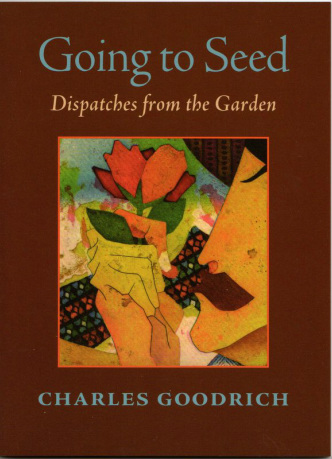
“The musings of a latter-day Zen gardener. Sly, quirky, candid, unique—each one informed by keen observation and a wry humor. Sometimes startling. Always engaging. Nothing like them anywhere.” —Clemens Starck
"Charles Goodrich's missives from the garden are winsome and precise, offering a tonic of reflection and compassion for troubled times. Losing himself to pole beans and garlic, he finds the deeper humanity that comes from having hands and head close to the earth. Read and reread this collection to remember how to hear and see the beauty of the small." —Alison Hawthorne Deming
“In Going to Seed: Dispatches from the Garden, Charles Goodrich chronicles the changing seasons manifested in his garden. He evokes plants and animals, and our deep human congress with the earth in exquisitely drawn poems, but the heartbeat at the center of his book is the recognition that death is the fuel for all the life that rises out of the fecund earth. This is no dainty plot, no white-gloved garden of roses and daffodils. Goodrich’s garden is a teaming, treacherous terrain of great peril, and even greater earthy delights.” —Gary Young
Read the Oregonian review by Joseph Bednarik
"Charles Goodrich's missives from the garden are winsome and precise, offering a tonic of reflection and compassion for troubled times. Losing himself to pole beans and garlic, he finds the deeper humanity that comes from having hands and head close to the earth. Read and reread this collection to remember how to hear and see the beauty of the small." —Alison Hawthorne Deming
“In Going to Seed: Dispatches from the Garden, Charles Goodrich chronicles the changing seasons manifested in his garden. He evokes plants and animals, and our deep human congress with the earth in exquisitely drawn poems, but the heartbeat at the center of his book is the recognition that death is the fuel for all the life that rises out of the fecund earth. This is no dainty plot, no white-gloved garden of roses and daffodils. Goodrich’s garden is a teaming, treacherous terrain of great peril, and even greater earthy delights.” —Gary Young
Read the Oregonian review by Joseph Bednarik
Insects of South Corvallis (poems; Cloudbank Books, 2003)
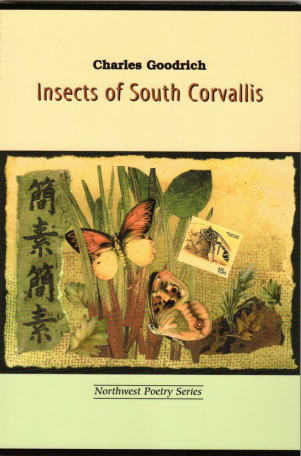
"The authentic presence of these poems is remarkable and offers the genuine protein—the verbs, the nouns, the images, and the voice—that only the best poetry has. Each poem is loaded with discoveries and gives us both an immediateand particular event and the distillation of long experience. This is one of thefinest books I've read in years." —Vern Rutsala
"Spiders, sow bugs, aphids, house flies, cabbage moths, stinging nettles—not to mention beans, peach pits, and the pockets of warm air lingering under willows—Goodrich's concern for all of nature, including us, is extraordinary, and absolutely genuine." —Ginger Andrews
"There is something quintessentially northwestern about Goodrich's poems. They have the simplicity, grace, and wistful humor of the poems of Kenneth O. Hanson as well as the commitment to daily life that marked William Stafford's poems." —David Romtvedt
"His seemingly casual poems have the artful simplicity of Japanese flower arrangement. Each one is a little object to behold and ponder. Bashō would have liked them." —Clemens Starck
"Spiders, sow bugs, aphids, house flies, cabbage moths, stinging nettles—not to mention beans, peach pits, and the pockets of warm air lingering under willows—Goodrich's concern for all of nature, including us, is extraordinary, and absolutely genuine." —Ginger Andrews
"There is something quintessentially northwestern about Goodrich's poems. They have the simplicity, grace, and wistful humor of the poems of Kenneth O. Hanson as well as the commitment to daily life that marked William Stafford's poems." —David Romtvedt
"His seemingly casual poems have the artful simplicity of Japanese flower arrangement. Each one is a little object to behold and ponder. Bashō would have liked them." —Clemens Starck
The Practice of Home: Biography of a House (essays: Lyons Press, 2004)
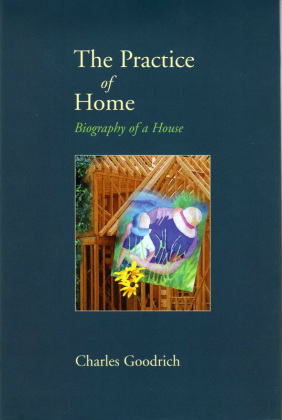
"So fervently is the possibility of and hope for a good life embraced in this book, reading it at times brought tears to my eyes. Here is a wry and poetic glimpse into a man's home-making. May we all be so embedded in family, community and place -- which is to say, home -- and so heroically dedicated to them. Goodrich's life makes sense.”
–Janisse Ray, author of Ecology of a Cracker Childhood
"The Practice of Home is a celebration of the work of hands; a meditation on the ecology of sacred spaces; an argument for one’s dwelling as a vital nexus of the communal, the familial, and the private; and above all a resounding confirmation that beneath the apparent lunacy of building one’s own house lies the deep and satisfying sanity of a life that is literally home-made." –Ted Leeson, author of The Habit of Rivers
“In essays that are rueful and funny and humane, Charles Goodrich brings his poet's sense of rejoicing and his gardener's sense of hope to a patch of thistle-infested land. Gently, brilliantly, he shows us that home is a way of life. Anyone who has searched to find a place on earth--which is to say, everyone--will find comfort and laughter in this book, and new understanding of what it means to be a human being.”
– Kathleen Dean Moore, author of The Pine Island Paradox
–Janisse Ray, author of Ecology of a Cracker Childhood
"The Practice of Home is a celebration of the work of hands; a meditation on the ecology of sacred spaces; an argument for one’s dwelling as a vital nexus of the communal, the familial, and the private; and above all a resounding confirmation that beneath the apparent lunacy of building one’s own house lies the deep and satisfying sanity of a life that is literally home-made." –Ted Leeson, author of The Habit of Rivers
“In essays that are rueful and funny and humane, Charles Goodrich brings his poet's sense of rejoicing and his gardener's sense of hope to a patch of thistle-infested land. Gently, brilliantly, he shows us that home is a way of life. Anyone who has searched to find a place on earth--which is to say, everyone--will find comfort and laughter in this book, and new understanding of what it means to be a human being.”
– Kathleen Dean Moore, author of The Pine Island Paradox
Proudly powered by Weebly
